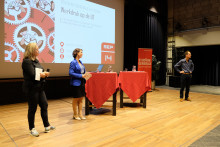The event was part of the network’s ongoing series dedicated to ‘#MeToo in Academia’. This second meeting of the series was led by Steenbergen, who stressed the importance of developing a university-wide policy on how people should and should not behave at a workplace.
One document to bind them all
‘If you search, you will find the UT’s Code of Ethics and other relevant documents. These things are available, but you really have to look and I think that’s a problem. The information is spread out, not interlinked and not easy to find,’ Steenbergen explained why his group decided to create their own code of conduct. ‘We wanted a single document that links to all other existing documents.’
‘Every new and current member of the group needs to read and sign the code. It describes what it means to work in the group and what the acceptable behavior is. It covers various topics including lab safety, work with test subjects and scientific integrity,’ continued the BMPI professor.
‘Talk about it!’
The code of conduct also strongly relates to topics such as sexual harassment, discrimination and exploitation. A big part of it is dedicated to ‘Recognizing and reporting concerns’. It lists examples of unacceptable behavior and parties you can turn to – as a victim or as a witness. ‘There are different people you can approach, depending on the situation. You can talk to your supervisor, a confidential advisor, a student counsellor or a group member. We have specifically chosen three non-scientific staff members, who can be contacted. The main thing is to talk about it. That gets things moving,’ believes Steenbergen.
The BMPI code of conduct has existed since November 2017. Has the group noticed any changes since then? ‘We didn’t used to have a culture of asking people whether they were okay, if they felt good working in the group. That seems to be different now,’ answered the professor and a PhD student from his group added: ‘Someone actually came to me to discuss a difficult situation, so I feel the code has had an impact. I see a difference in how people communicate.’
‘This should be dealt with on a central level’
Wiendelt Steenbergen thinks the University of Twente should consider implementing a similar code of conduct, but one valid for the entire university. ‘We should have a university-wide code of conduct that includes clear procedures, that is accessible through one entry and easily understandable for everyone, therefore available in both Dutch and English. Why shouldn’t we ask all UT employees to read and sign it?’
'There needs to be a continuous pressure on the UT board'
‘To accomplish this, there needs to be a continuous pressure on the UT board,’ concluded Steenbergen. ‘There still seems to be some hesitation from their side, but I believe this should be dealt with on a central level.’







